TGIF :: Knowing More = Drinking Less
#99 || How personal journeys, public health data, and grassroots campaigns are changing the way we drink
I explore what it means to live undimmed—present and aware of the ways we dim out: through drinking, eating, snark, exercise, shopping, sex, work, drugs—even over-functioning.
I do not paywall my offerings, everything I have ever published on Substack (99 newsletters to date!) is currently available for free here.
If you want to support my writing, you can (1) become a paid subscriber here, (2) share this newsletter with someone you think might appreciate it, (3) pre-order Undimmed: The Eight Awarenesses for Freedom from Unwanted Habits, or (4) send me some feedback by replying to this email or via the app (I actually love it — all flavors!).
Quiet shifts
I pay fairly close attention to drinking trends — both in my immediate life and in the broader culture around us. This week, I’ve noticed some momentum around drinking less, as well as enduring sensitivity about it.
In just 24 hours, three friends reached out to let me know where they were on their respective dry journeys — from just a few days in, to marking a one-year alcohol-free anniversary. Their notes were sensitive, private — one referenced their spouse who is “ahead” days-wise. I asked one friend if he’d be willing to do an interview about his experience for my Substack. His response was prompt and candid: he’s not ready to be public about his experience with alcohol yet.
I remember this part, at least my version of it.
When I first paused in 2017, it was a super strange experience. I felt immediately more alone than I had in years — the common salve suddenly absent from my toolbox of social connection. Would I dance again? Initiate sex? Enjoy camping? These were things I only did if I was a bit buzzed in those years. Unsure if I’d be tempted to breach commitments to myself in certain environments, I avoided most bars and alcohol-centric events for weeks.
Soon enough, I was sure I wouldn’t be going back, and that trepidation evolved into condescension. I felt so good and so smart about my choices that I was probably too vocal, too proud of them. It felt like strength, like willpower I could flex. And I’m pretty sure I did. (Cringe.)
Shame doesn’t have to be part of the story
I happened to catch part of a podcast this week that made we wonder if part of our silence around these shift is linked to shame. Addiction, whether to alcohol, nicotine, food, or anything else, has long been framed as a moral or willpower failing, rather than a human or biology-based struggle. When that’s the pervasive lens, it’s no wonder so many of us keep our changes private — especially early on — unsure how our choices will be received.
It was Abby Wambach in a recent episode of We Can Do Hard Things with Dr. Anna Lembke (one of my absolute heroes). Abby shared the relief she experienced as she grokked the science of addiction:
“So many of us living with addiction carry this huge amount of shame — asking, why can’t I do this? What’s wrong with me? … When I read your work, it de-shamed me because it’s my brain. It made it feel more scientific than moral.”
— Abby Wambach, We Can Do Hard Things, Ep. 436, “Are You a Dopamine Addict?” (Aug. 12, 2025) (transcript)
This shift from moral judgment to scientific understanding can be enormously powerful: more open conversations, less quiet, and less shame.
Perhaps even more fascinating, while shame can keep us quiet, research is confirming that it is often the right information, science and facts, that can spark a durable shift.
Tipping points
This all reminded me of quitting smoking cigarettes a decade earlier. I’d tried for years, on and off, but never had a compelling reason to stick with it. I was private about each time I tried too, afraid of having to tell people I’d gone back, given up, failed to keep my commitment to myself. Truth be told, for over a decade before I quit for good, I never smoked unless I was drinking — and with just one drink to compromise my judgment, that was often enough.
The “once and for all reason” finally came in 2008 when our infant son was hospitalized twice in three months, each time struggling with asthma. When the pediatric pulmonologist told me that even one cigarette a day — smoked outside, after he went to sleep — could still be affecting him, with toxins lingering on my clothes, in my hair, and on my skin, I knew in that moment I’d never smoke again. And I haven’t. Science, facts — these took the complication of decision out of the equation.
Maybe that’s what’s happening now. With growing awareness of the link between alcohol and cancer, it’s getting easier to cut back. Science is lending a hand to willpower.
Not just a trend, knowledge is changing habits; alcohol consumption (in the U.S.) hits a 90 year low
It’s been a hot topic this week — splashed across headlines, popping up on morning shows, and landing in my inbox from more friends than I can count (thank you!).
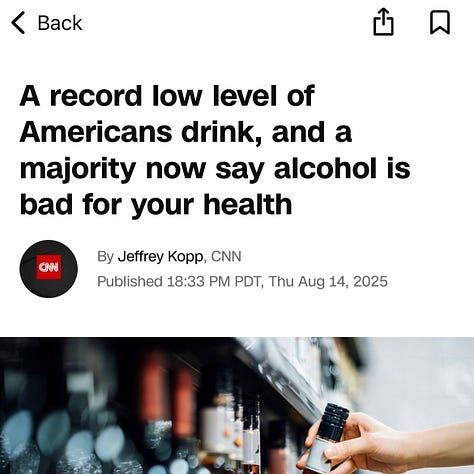
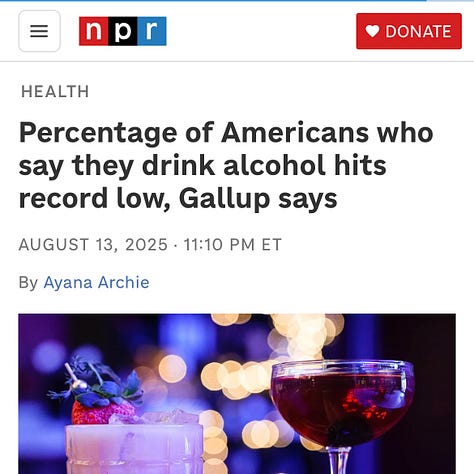
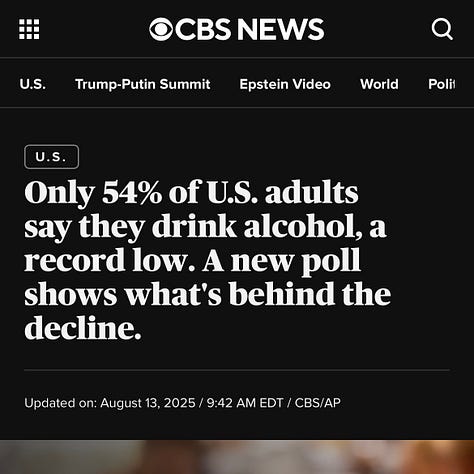
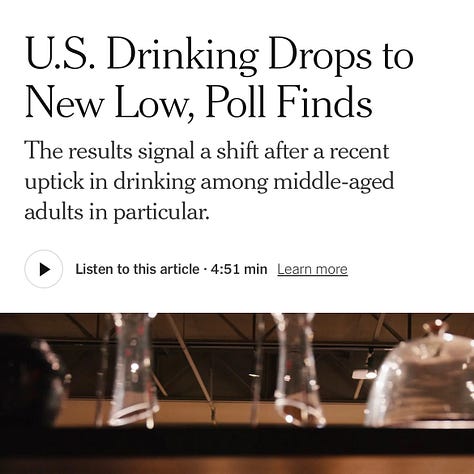
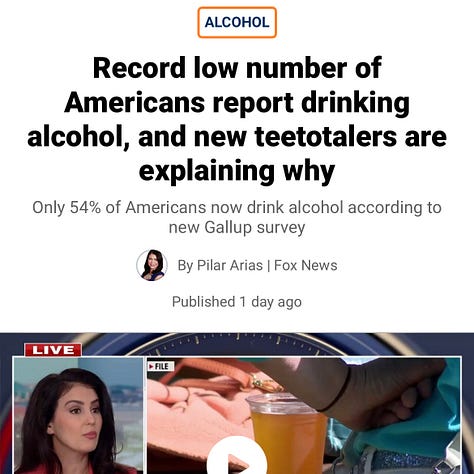
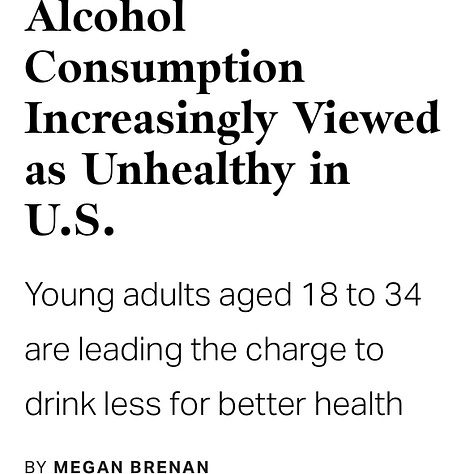
Fresh Gallup data has sparked a wave of conversation about how our drinking habits are changing. The numbers are clear: we’re drinking less, less than in almost a century! And while there are plenty of theories about why — the cost, shifting social norms, the pull of wellness trends — recent research points to something deeper. More of us are learning about the serious health risks of alcohol, including its proven link to several deadly cancers. That awareness, more than anything else, seems to be driving this quiet, steady decline.
WASHINGTON, D.C. — The percentage of U.S. adults who say they consume alcohol has fallen to 54%, the lowest by one percentage point in Gallup’s nearly 90-year trend. This coincides with a growing belief among Americans that moderate alcohol consumption is bad for one’s health, now the majority view for the first time. - Gallup Poll + (New York Times coverage here)
My commitment and why this is all hitting home ❤️🩹
Some of you will recall a post I’ve published (and re-published) about my own personal experience with breast cancer. The net of it is that I made a deal with the Universe: save me from the difficulties of a metastasis and I’ll do my part to help raise awareness of the link between alcohol and cancer.
Since then, in addition to extensively writing and speaking about the topic, I’ve joined the board of the United States Alcohol Policy Alliance (USAPA). With a (very) modest budget, we’re our part to reduce the harms of alcohol. One of those efforts is partnering with the team behind Drink Less for Your Breasts, a California campaign raising awareness about the proven link between alcohol use and breast cancer.
How we can all help
The campaign is now going national, with a goal of making sure every woman in the U.S. knows the facts so she can make more informed choices about drinking. With breast cancer rates on the rise, and no federal action on alcohol warning labels expected anytime soon, now is the moment to act.
It is outrageous that most women don’t know that drinking alcohol increases breast cancer risk. Doctors and oncologists barely inquire about it, even when treating people for the disease. Meanwhile, the alcohol industry spends over $5 billion every year convincing us that drinking is essential to every social occasion, specifically targeting women in predatory ways.
If you want to learn more or get involved, reach out to the incredible Dr. Priscilla Martinez-Matyszczyk, creator of Drink Less for Your Breasts, at pmartinez@arg.org.
⭐️ You can also donate here. ⭐️
Closing the loop
The shift I’m seeing, people quietly choosing to drink less, feels like part of something bigger. I am not anti-alcohol, but I sure am for informed choices. My hope is that with more research, more awareness, and more open, shame-free conversations, we have have a more open dialogue about what we’re doing, not doing, and why.
Love.
⭕️ The next Saturday Sangha is Saturday September 6th, 2025 at 9:00 AM PT / Noon ET. We begin with a brief meditation, set a bit of context, and then open the space for shared exploration. While not about “sobriety” or “recovery,” we are all actively exploring a life without dimmers. These are beautiful hours and I was reminded this week that we’ve been at this for two years now. Thank you to those who join. Link for an invitation here.
💊 Our ClearLife Reset supplement, support for the first 30 days AF, is starting to gain some viral steam even though we are very slow to market the product. If you are taking a break, consider giving it a try. Testimonials include:
“I am a social drinker who regularly does the no-drink challenges (Dry January, Sober Spring, etc.). Not only did these supplements help curb my alcohol craving triggers (5 o'clock happy hour on Fridays, for example), they also aided in helping me sleep so soundly. The combination of ingredients is impressive, as is the lack of excess junk many supplement companies put in their product. I recommend this product to anyone who wants extra support in their dry (clear) era.” -Erin
“I was impressed from the start with ClearLife Reset and its sleek packaging and design. My reset coincided with a very difficult month. I was amazed at how energized and calm I felt and how well I slept. Taking these supplements was a welcome daily reminder about all the healthy goodness I was giving my body during this break.” -A.L.



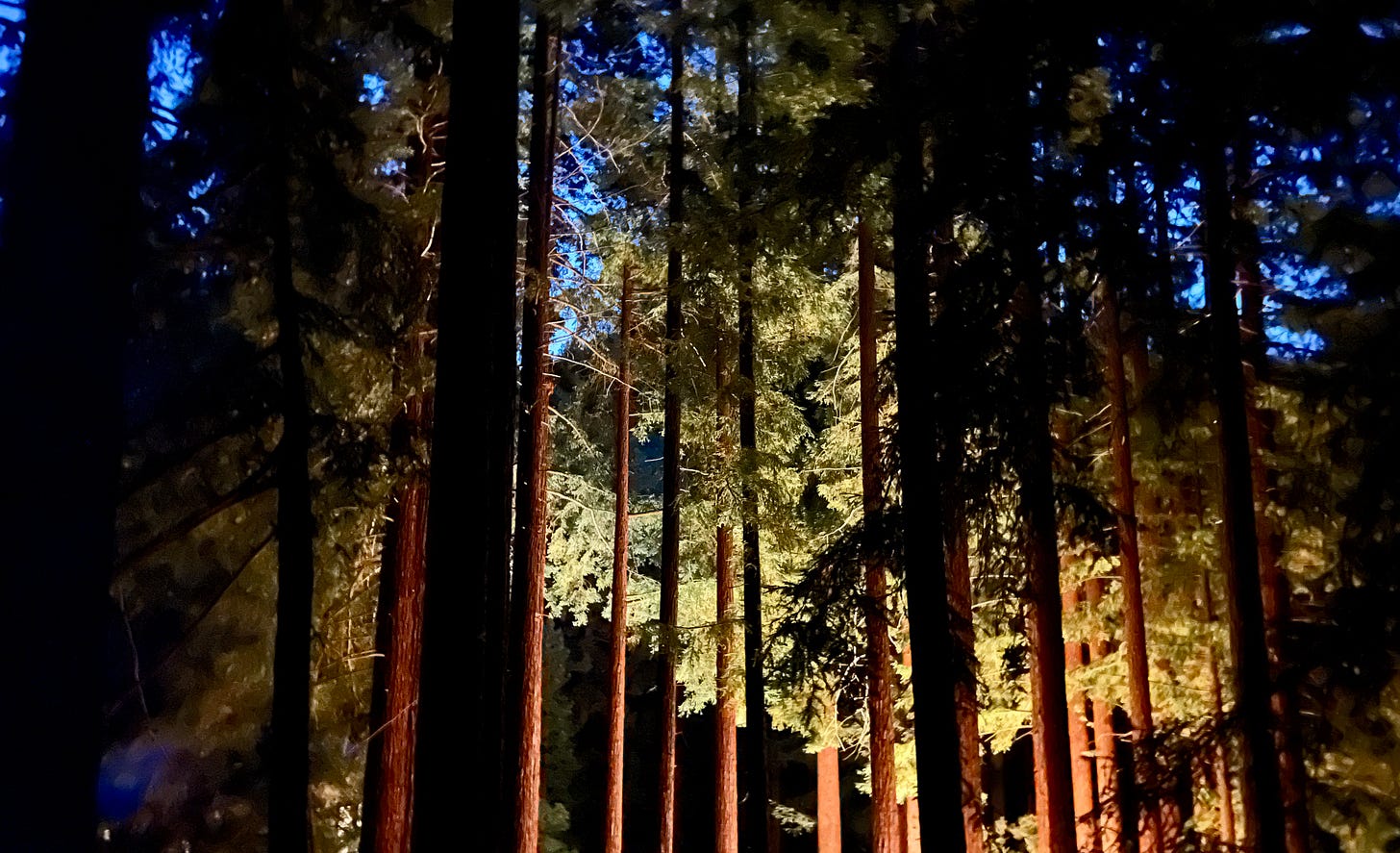


such a well written and well balanced article!